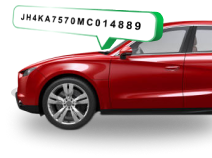Kansas VIN Check


How to Perform a VIN Lookup in Kansas?
A Kansas VIN search provides an accessible and effective service that parties can use to learn more about their vehicle. Interested parties can view different elements of vehicles they are interested in, such as features, pricing, history, and title records. The information is sourced from both public and private databases. State institutions like the Kansas Department of Revenue feed into the NMVTIS, which assists states and law enforcement in preventing title fraud, among other discrepancies.
As an accredited NMVTIS data provider, GoodCar provides valuable information to all requesters. To perform the VIN search, navigate to the platform home page and click the designated tab. It is next to the License Plate search, except you do not have to fill in the registered state.
Why Should I Run a ks VIN Check?

A VIN check is useful for quickly obtaining important information about a vehicle. It can be used to determine the vehicle's accident history, title validity, odometer readings, inspection history, and more.
Kansas Lemon Laws apply to purchasing and leasing of new motor vehicles that are categorized under 12,000 pounds. It offers a procedure that requesters can follow as a remedy if the vehicle falls into the lemon category. That is a vehicle with a hidden defect from the manufacturer that impedes use or causes safety issues. The Kansas Lemon Law provides that repairs have to be attempted by the manufacturer for a finite period. If the repairs done by the manufacturer cannot permanently solve the problem, then the vehicle will be presumed to be a lemon.
The manufacturer will also have to replace or repurchase the vehicle. Vehicles replaced by the manufacturer have to be of the same caliber as the vehicle that was submitted for replacement. Kansas state laws also contain definitions. For a vehicle to qualify as a lemon, it has to be within a year of the purchase date and be covered by a manufacturer warranty. If a state resident suspects that they may have a lemon, they have to file a complaint with the state Attorney General’s office.
Why Choose GoodCar for Kansas VIN Lookup?
Requesters can benefit from extensive vehicle records and reports as they obtain information from accredited data providers like the NMVTIS. GoodCar also illustrates theft checks, collision records, recalls, flood, hail, or fire damage, and pricing.
Kansas Resources
-
Who Issues A Vehicle's Vin Number In Kansas?
In Kansas, the manufacturer is tasked with issuing VIN numbers. However, the state may assign VINs to cars during accidents or cases of recovered stolen vehicles.
-
How do I verify a VIN number in Kansas?
Kansas Highway Patrol officers can verify VIN numbers. These inspections are required during registration within and outside the state.
-
Is it safe to check a Kansas VIN online?
Yes, checking a Kansas VIN online should be safe because these are public records, and the information they provide may be accessible to all parties.
-
Are Kansas VIN checks necessary for out-of-state vehicles brought into Kansas?
Yes, VIN checks are required for out-of-state vehicles during the registration process.
-
What does a Kansas VIN check reveal?
A Kansas VIN check will reveal vehicle records, accident history, mileage, problem checks, and title records.
-
Can you ask for the VIN from a Kansas seller?
Yes, it would be advisable to ask for the VIN from a Kansas seller because of the due diligence to ensure the buyer has peace of mind when purchasing a vehicle.







